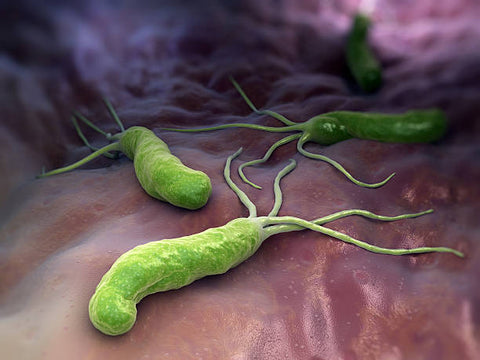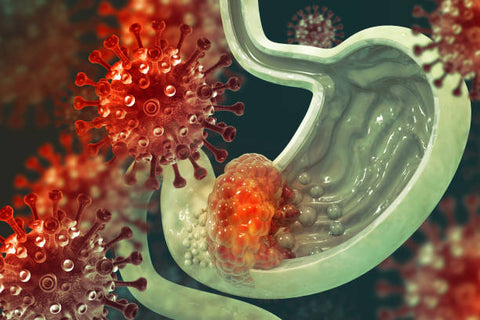What are Ulcers?
An ulcer is an open sore that can occur in various parts of the body. It can develop on the skin, in the stomach, or in the intestines. An ulcer is typically caused by an infection, irritation, or injury.
Ulcers, also known as peptic ulcers. They can be painful and annoying and can make eating and drinking uncomfortable. While ulcers can be caused by certain medications, the most common cause is an infection of Helicobacter pylori bacteria.

What Causes Ulcers?
The most common cause of ulcers is an infection of the Helicobacter pylori (H. pylori) bacteria. These bacteria live in the stomach and cause irritation and inflammation of the stomach lining, which can lead to ulcers. Other causes of ulcers include smoking, excessive alcohol consumption, certain medications, and stress.

Symptoms
1. Stomach Ulcers: Symptoms and Causes
2. Burning Sensation in the Stomach: The Most Common Symptom of Stomach Ulcers
3. Abdominal Pain: Another Symptom of Stomach Ulcers
4. Vomiting and Nausea: Possible Signs of Stomach Ulcers
5. Poor Appetite: Yet Another Symptom of Stomach Ulcers
6. Heartburn: Commonly Associated With Stomach Ulcer Symptoms
7. Bloating and Gas: Commonly Associated With Stomach Ulcer Symptoms
Diagnosis of Ulcers
A doctor can diagnose an ulcer by performing a physical exam, taking a medical history, and ordering tests, such as an endoscopy, blood tests, and imaging tests.

Dietary Changes for Ulcer Relief
Dietary changes can also help to reduce the symptoms of ulcers. Avoiding foods that are high in fat and spicy foods can help reduce the amount of acid in the stomach and provide relief from pain and discomfort. Eating smaller meals more often and drinking plenty of fluids can also help to reduce the symptoms of ulcers.
Treatments for Ulcers
1. Eat a Healthy Diet: Eating a healthy diet with plenty of fruits and vegetables, whole grains, and lean proteins can help speed up the healing process of an ulcer and reduce symptoms. Try to avoid foods that are high in fat and spices, which can irritate and delay healing.
2. Avoid Certain Medications: Non-steroidal anti-inflammatory drugs (NSAIDs) can aggravate ulcers and delay healing. Avoid these medications or take them with food to reduce the risk of irritation.
3. Take Antacids or Acid Blockers: Taking antacids or acid blockers can help to reduce the amount of acid in the stomach and relieve symptoms.
4. Eat Smaller Meals: Eating smaller meals more frequently can help to reduce the amount of acid that is released in the stomach.
5. Quit Smoking: Smoking can aggravate ulcers and delay healing. Quitting smoking is important for both preventing ulcers and for healing them.
6. Take Probiotics: Probiotics can help to reduce inflammation in the stomach and intestines, which can help ulcers to heal faster.
7. Manage Stress: Stress can worsen ulcer symptoms and delay healing. Taking steps to manage stress, like meditation, yoga, or deep breathing, can help to reduce symptoms and speed up the healing process.
Preventing Ulcers
The best way to prevent ulcers is to avoid the risk factors that can lead to them, such as smoking, excessive alcohol consumption, and certain medications. Eating a healthy diet and avoiding foods that are high in fat and spicy foods can also help to reduce the risk of developing ulcers. Maintaining a healthy lifestyle, avoiding stress, and getting regular check-ups can also help to prevent ulcers.
Conclusion
Ulcers are sores that occur in the lining of the stomach, small intestine, and esophagus. While ulcers can be caused by certain medications, the most common cause is an infection of Helicobacter pylori (H. pylori) bacteria. The most effective treatment for ulcers is a course of antibiotics. Other treatments include over-the-counter medications, such as antacids and H2 blockers. Dietary changes and avoiding risk factors, such as smoking and excessive alcohol consumption, can also help to reduce the risk of developing ulcers.












